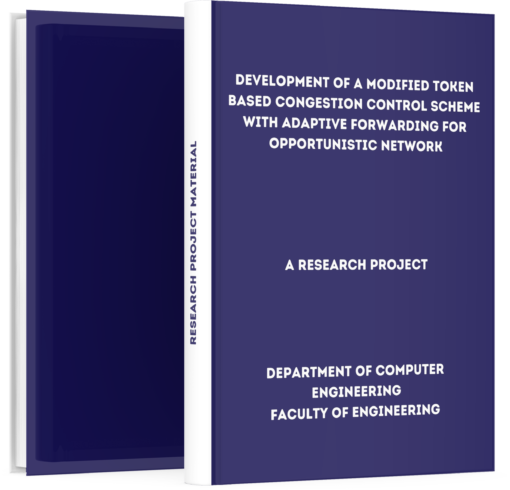Development of a Modified Token Based Congestion Control Scheme with Adaptive Forwarding for Opportunistic Network
₦3,000.00
If you are interested in getting this project material “Development of a Modified Token Based Congestion Control Scheme with Adaptive Forwarding for Opportunistic Network”, click on the DOWNLOAD BUTTON to make payment and the file will be delivered to your email immediately after confirmation.
Description
– Development of a Modified Token Based Congestion Control Scheme with Adaptive Forwarding for Opportunistic Network –
Download Development of a Modified Token Based Congestion Control Scheme with Adaptive Forwarding for Opportunistic Network. Computer Engineering students who are writing their projects can get this material to aid their research work.
Abstract
This research presents the development of a modified token-based congestion control scheme with an adaptive forwarding mechanism (mTBCC) algorithm for addressing congestion problems in opportunistic networks (OppNets).
The algorithm addresses the limitations associated with the standard token-based congestion control (TBCC) in terms of its ability to redirect the traffic from more congested nodes of OppNet to congestion-free nodes without necessarily compromising computational time.
This is because the TBCC has the tendency to drop a significant number of messages when a node is full (overflow) in order to control congestion. OppNet was modeled using ONE simulator with Eclipse, which is a java based programming language.
Introduction
This section consists of two subsections. The first section addresses the fundamental concepts critical to the research. The other part of the review focus on similar works of different researchers who worked in this domain. The works are critically studied to establish the ground to bring in the contribution of this work, which is aimed to achieve.
This section introduces the fundamental concepts pertinent to the research, which includes delay tolerant networks, delay-tolerant network routing protocols, opportunistic networks, congestion control scheme, and opportunistic network environment (ONE) simulator.
Delay tolerant networks (DTNs) represent a full division of wireless networks which requires minimum to no infrastructures and has the potential to support network functionality experiencing frequent and long-lasting partition.
How to Download this Project Material
First, note that we are one of the best and most reliable online platforms because we don’t retain any of your personal information or data as regards making payments online.
PRICE: ₦3,500 ₦3,000 (Three Thousand Naira Only)
Make a bank deposit or mobile transfer of ₦2,000 only to the account given below;
Bank Name: UBA
Account Number: 1022564031
Account Name: TMLT PRO SERVICES
After making the payment, CLICK HERE to send the following on WhatsApp;
- Depositor’s Name or Screenshot of Payment
- Name of the Past Question
- Active Email Address
or Call Us On +2348082284439
Once your details have been received and your payment confirmed by us, you will receive the past question in your email or WhatsApp within 5 Minutes.
Guarantee of Getting the Material
We understand that due to the high rate of fraud, many people are afraid of making purchases online but be rest assured that PastExamQuestions will deliver your material after payment.
Once your details have been received and your payment confirmed by us, you will receive the past question in your email or WhatsApp.
Give us Feedback
Have we been able to satisfy you? How well do you think the material will be helpful after having gone through it? Does the price worth the material? Let’s hear from you!
We recommend that our customers give feedback at the end of every transaction to enable us to serve better. You can do this by clicking the review button on this page.
Where is the review button? >> Just scroll up to where you see reviews





Reviews
There are no reviews yet.